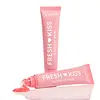What's inside
What's inside
 Key Ingredients
Key Ingredients

 Benefits
Benefits

 Concerns
Concerns

No concerns
 Ingredients Side-by-side
Ingredients Side-by-side

Bis-Diglyceryl Polyacyladipate-2
EmollientDiisostearyl Malate
EmollientPolyisobutene
Hydrogenated Polyisobutene
EmollientMicrocrystalline Wax
Emulsion StabilisingButyrospermum Parkii Butter
Skin ConditioningOctyldodecanol
EmollientDisteardimonium Hectorite
StabilisingSynthetic Wax
AbrasivePhenoxyethanol
PreservativeVanillin
MaskingEthylhexyl Palmitate
EmollientZinc Carbonate
Tocopheryl Acetate
AntioxidantParfum
MaskingTribehenin
EmollientPalmitoyl Tripeptide-5
Skin ConditioningSorbitan Isostearate
EmulsifyingWater
Skin ConditioningRicinus Communis Seed Oil
MaskingLactic Acid
BufferingSodium Hyaluronate
HumectantGlycerin
HumectantHydrogenated Castor Oil
Emollient1,2-Hexanediol
Skin ConditioningHydroxypropyl Cyclodextrin
MaskingEthylhexylglycerin
Skin ConditioningCI 77491
Cosmetic ColorantCI 42090
Cosmetic ColorantCI 15850
Cosmetic ColorantCI 77499
Cosmetic ColorantBis-Diglyceryl Polyacyladipate-2, Diisostearyl Malate, Polyisobutene, Hydrogenated Polyisobutene, Microcrystalline Wax, Butyrospermum Parkii Butter, Octyldodecanol, Disteardimonium Hectorite, Synthetic Wax, Phenoxyethanol, Vanillin, Ethylhexyl Palmitate, Zinc Carbonate, Tocopheryl Acetate, Parfum, Tribehenin, Palmitoyl Tripeptide-5, Sorbitan Isostearate, Water, Ricinus Communis Seed Oil, Lactic Acid, Sodium Hyaluronate, Glycerin, Hydrogenated Castor Oil, 1,2-Hexanediol, Hydroxypropyl Cyclodextrin, Ethylhexylglycerin, CI 77491, CI 42090, CI 15850, CI 77499
Bis-Behenyl/Isostearyl/Phytosteryl Dimer Dilinoleyl Dimer Dilinoleate
EmollientDiisostearyl Malate
EmollientPolyisobutene
Hydrogenated Polyisobutene
EmollientOctyldodecanol
EmollientCaprylic/Capric Triglyceride
MaskingPolyglyceryl-2 Triisostearate
EmulsifyingParaffin
PerfumingSilica Dimethyl Silylate
EmollientMicrocrystalline Wax
Emulsion StabilisingStearalkonium Hectorite
Gel FormingAroma
Propylene Carbonate
SolventTocopheryl Acetate
AntioxidantIsohexadecane
EmollientAspartame
Pentaerythrityl Tetra-Di-T-Butyl Hydroxyhydrocinnamate
AntioxidantTocopherol
AntioxidantEthylene/Propylene/Styrene Copolymer
Butylene/Ethylene/Styrene Copolymer
Phenoxyethanol
PreservativeSodium Hyaluronate
HumectantXanthan Gum
EmulsifyingAluminum Hydroxide
EmollientTripeptide-1
Skin ConditioningCI 77891
Cosmetic ColorantCI 19140
Cosmetic ColorantCI 15850
Cosmetic ColorantIron Oxides
Bis-Behenyl/Isostearyl/Phytosteryl Dimer Dilinoleyl Dimer Dilinoleate, Diisostearyl Malate, Polyisobutene, Hydrogenated Polyisobutene, Octyldodecanol, Caprylic/Capric Triglyceride, Polyglyceryl-2 Triisostearate, Paraffin, Silica Dimethyl Silylate, Microcrystalline Wax, Stearalkonium Hectorite, Aroma, Propylene Carbonate, Tocopheryl Acetate, Isohexadecane, Aspartame, Pentaerythrityl Tetra-Di-T-Butyl Hydroxyhydrocinnamate, Tocopherol, Ethylene/Propylene/Styrene Copolymer, Butylene/Ethylene/Styrene Copolymer, Phenoxyethanol, Sodium Hyaluronate, Xanthan Gum, Aluminum Hydroxide, Tripeptide-1, CI 77891, CI 19140, CI 15850, Iron Oxides
 Reviews
Reviews

Ingredients Explained
These ingredients are found in both products.
Ingredients higher up in an ingredient list are typically present in a larger amount.
Ci 15850 is the pigment color red. It is an azo dye and created synthetically.
Azo dyes need to be thoroughly purified before use. This allows them to be more stable and longer-lasting.
This ingredient is common in foundations, lipsticks, and blushes. This color is described as brown/orangey red.
It has many secondary names such as Red 6 and Red 7. According to a manufacturer, Red 6 usually contains aluminum.
Learn more about CI 15850Diisostearyl Malate is an emollient and most often used in lip products. It comes from isostearyl alcohol, a fatty acid, and malic acid, an AHA.
As an emollient, Diisostearyl Malate helps create a thin film on your skin to trap moisture in. This helps keep your skin soft and smooth.
Hydrogenated Polyisobutene is a synthetic polymer. Polymers are compounds with high molecular weight. Hydrogenated Polyisobutene is an emollient and texture enhancer.
In one study, Hydrogenated Polyisobutene showed better skin hydration levels than Caprylic/Capric Triglyceride. As an emollient, it helps keep your skin soft and hydrated by trapping moisture in.
Hydrogenated Polyisobutene is often used as a mineral oil replacement.
Learn more about Hydrogenated PolyisobuteneMicrocrystalline Wax is created by de-oiling petroleum. It is highly refined and purified before being added to cosmetics.
Microcrystalline Wax is used to enhance the texture and create even consistency. It helps stabilize a product by preventing ingredients from separating.
Octyldodecanol is a fatty alcohol. It is primarily used to enhance the texture of products.
As an emulsifier, Octyldodecanol helps prevent the oils and waters from separating. It also prevents ingredients from creating foam when shaken.
Octyldodecanol is created by reducing fatty acid to an alcohol.
Due to its high molecular weight, it does not get absorbed into the skin.
Learn more about OctyldodecanolPhenoxyethanol is a preservative that has germicide, antimicrobial, and aromatic properties. Studies show that phenoxyethanol can prevent microbial growth. By itself, it has a scent that is similar to that of a rose.
It's often used in formulations along with Caprylyl Glycol to preserve the shelf life of products.
Polyisobutene is a synthetic polymer made from isobutene.
It is a film-forming agent and helps bind ingredients together.
Polyisobutene is not absorbed by the skin.
Learn more about PolyisobuteneSodium Hyaluronate is hyaluronic acid's salt form. It is commonly derived from the sodium salt of hyaluronic acid.
Like hyaluronic acid, it is great at holding water and acts as a humectant. This makes it a great skin hydrating ingredient.
Sodium Hyaluronate is naturally occurring in our bodies and is mostly found in eye fluid and joints.
These are some other common types of Hyaluronic Acid:
Learn more about Sodium HyaluronateTocopheryl Acetate is AKA Vitamin E. It is an antioxidant and protects your skin from free radicals. Free radicals damage the skin by breaking down collagen.
One study found using Tocopheryl Acetate with Vitamin C decreased the number of sunburned cells.
Tocopheryl Acetate is commonly found in both skincare and dietary supplements.
Learn more about Tocopheryl Acetate